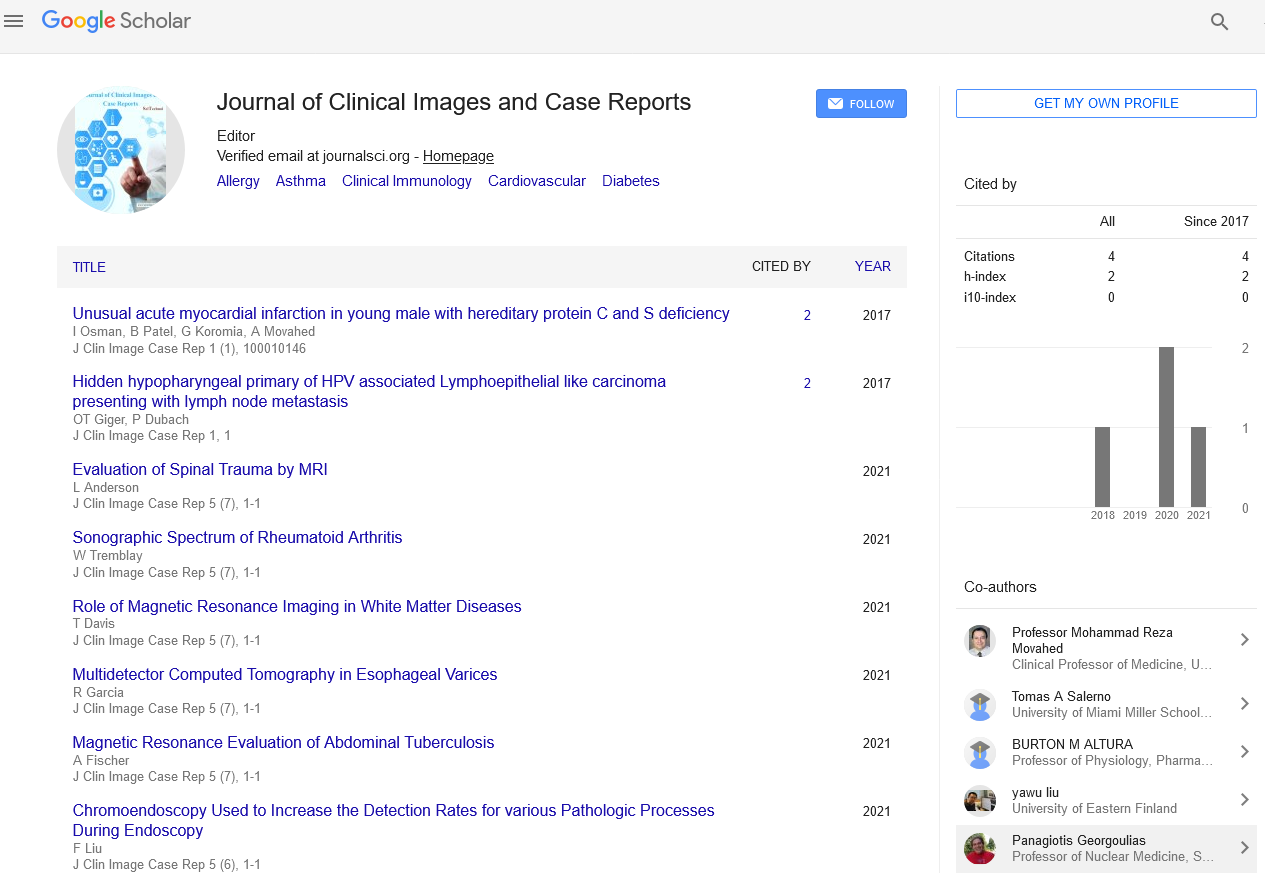Perspective, J Clin Image Case Rep Vol: 7 Issue: 1
A Comprehensive Guide to Gynecology: Women's Reproductive Health
Melissa Shahin*
Department of Gynecology, Sher-I-Kashmir Institute of Medical Sciences Srinagar, Jammu and Kashmir, India
*Corresponding Author: Melissa Shahin
Department of Gynecology, Sher-IKashmir
Institute of Medical Sciences Srinagar, Jammu and Kashmir, India
E-mail: shahinmelissa@gmail.com
Received date: 26-Dec-2022, Manuscript No. CICR-23-95470;
Editor assigned date: 29-Dec-2022, PreQC No. CICR-23-95470(PQ);
Reviewed date: 10-Jan-2023, QCNo CICR-23-95470;
Revised date: 18-Jan-2023, Manuscript No. CICR-23-95470(R);
Published date: 31-Jan-2023 DOI: 10.4172/CICR.1000233.
Citation: Shahin M (2023) A Comprehensive Guide to Gynecology: Women's Reproductive Health . J Clin Image Case Rep 7:1.
Description
Gynecology is a specialized branch of medical science that focuses on the diagnosis, treatment, and management of reproductive health issues in women. It encompasses a wide range of conditions, from routine gynecological care to complex reproductive disorders. In this comprehensive guide, we will explore various aspects of gynecology, including the importance of gynecological care, common gynecological conditions, diagnostic techniques, treatment options, and preventive measures.
The importance of gynecological care
Regular gynecological care is essential for maintaining women's reproductive health and overall well-being. Gynecologists play a crucial role in providing preventive care, early detection of reproductive disorders, and management of gynecological conditions. Women of all ages, from adolescence to post-menopause, should seek regular gynecological check-ups to ensure optimal reproductive health.
Common gynecological conditions
There are numerous gynecological conditions that women may experience throughout their lives. Some of the most common conditions include:
Menstrual disorders: Menstrual disorders such as irregular periods, heavy menstrual bleeding, and painful periods are common gynecological issues that can significantly impact a woman's quality of life.
Polycystic Ovary Syndrome (PCOS): PCOS is a hormonal disorder that affects the ovaries and can cause symptoms such as irregular periods, fertility issues, weight gain, and acne.
Diagnostic techniques in gynecology
Gynecologists use various diagnostic techniques to assess and diagnose gynecological conditions. These may include:
Physical examination: A comprehensive physical examination, including a pelvic exam, is an essential part of gynecological evaluation. It helps gynecologists assess the health of the reproductive organs and detect any abnormalities.
Imaging studies: Imaging studies such as ultrasound, MRI, or CT scan may be used to visualize the reproductive organs and detect conditions such as fibroids, ovarian cysts, or tumours.
Treatment options in gynecology
The treatment options for gynecological conditions depend on the type and severity of the condition, as well as the patient's age, overall health, and reproductive goals. Some common treatment options include:
Medications: Medications such as hormonal therapy, antibiotics, pain relievers, and contraceptive methods may be used to manage gynecological conditions. For example, hormonal therapy may be used to regulate menstrual cycles in conditions like PCOS, while antibiotics are prescribed to treat infections like PID.
Minimally invasive procedures: Minimally invasive procedures such as laparoscopy or hysteroscopy may be used to treat various gynecological conditions. These procedures involve small incisions and the use of specialized instruments to access and treat the reproductive organs. They are associated with less pain, shorter recovery times, and fewer complications compared to traditional open surgery.
Preventive measures in gynecology
Prevention is an essential aspect of gynecological care, and there are several preventive measures that women can take to maintain optimal reproductive health. These may include:
Regular check-ups: Women should schedule regular gynecological check-ups, including pelvic exams and Pap smears, as recommended by their healthcare provider. These screenings can help detect any early signs of gynecological conditions and allow for timely intervention.
Healthy lifestyle: Maintaining a healthy lifestyle, including regular exercise, a balanced diet, and managing stress, can help prevent gynecological conditions such as PCOS or menstrual disorders.
Vaccinations: Vaccinations against Human Papilloma Virus (HPV) can help prevent cervical cancer, which is a common gynecological cancer. It is recommended for girls and boys starting at age 11 or 12.
Conclusion
In conclusion, gynecology is a specialized field of medicine that plays an important role in women's reproductive health. Regular gynecological care, early detection of conditions, and timely intervention can help prevent and manage gynecological conditions, leading to better reproductive health outcomes. With a wide range of diagnostic techniques, treatment options, and preventive measures, gynecologists provide comprehensive care to women of all ages, from adolescence to post-menopause. It is important for women to prioritize their gynecological health and seek regular care from qualified healthcare providers to ensure optimal reproductive health and wellbeing.
 Spanish
Spanish  Chinese
Chinese  Russian
Russian  German
German  French
French  Japanese
Japanese  Portuguese
Portuguese  Hindi
Hindi 